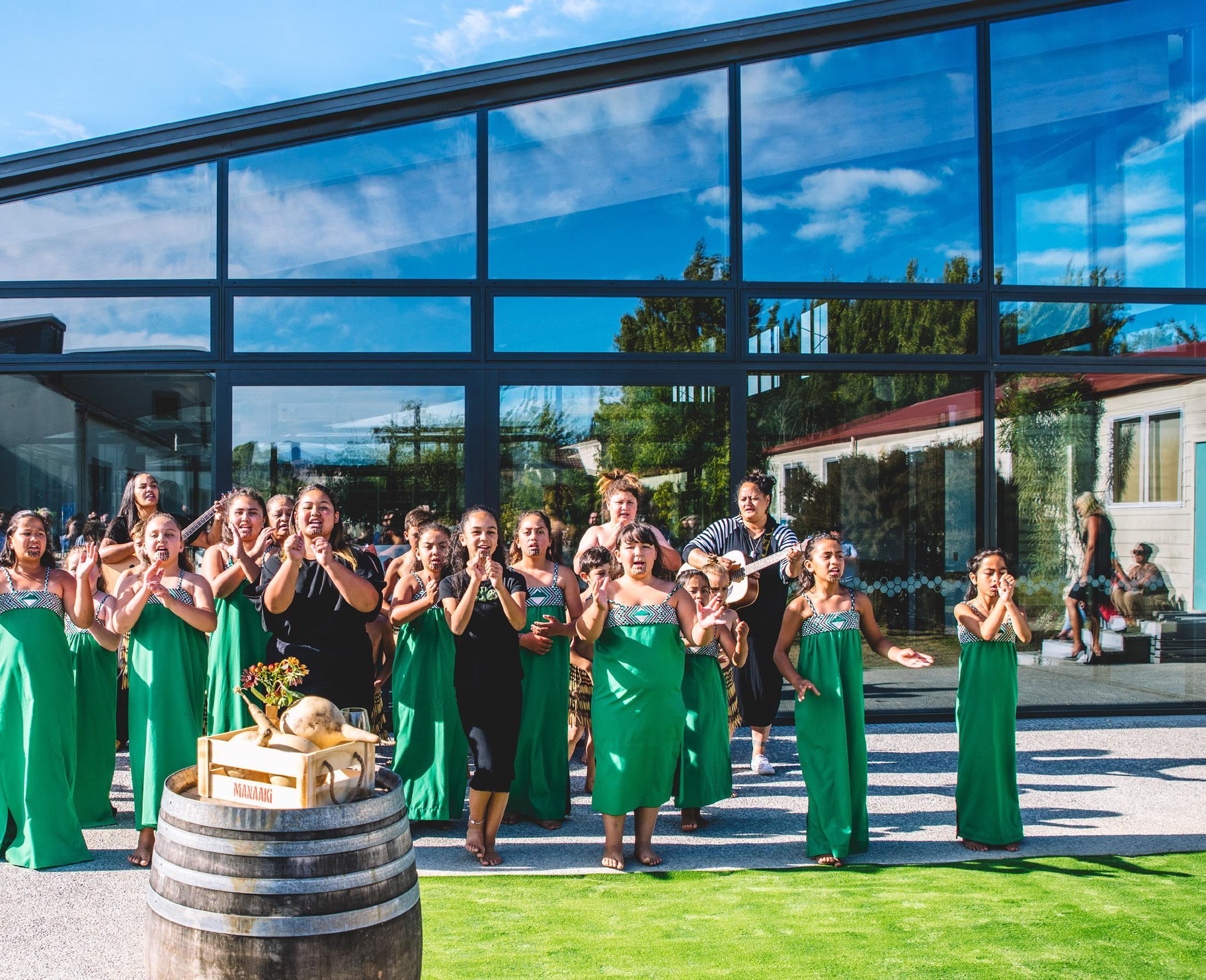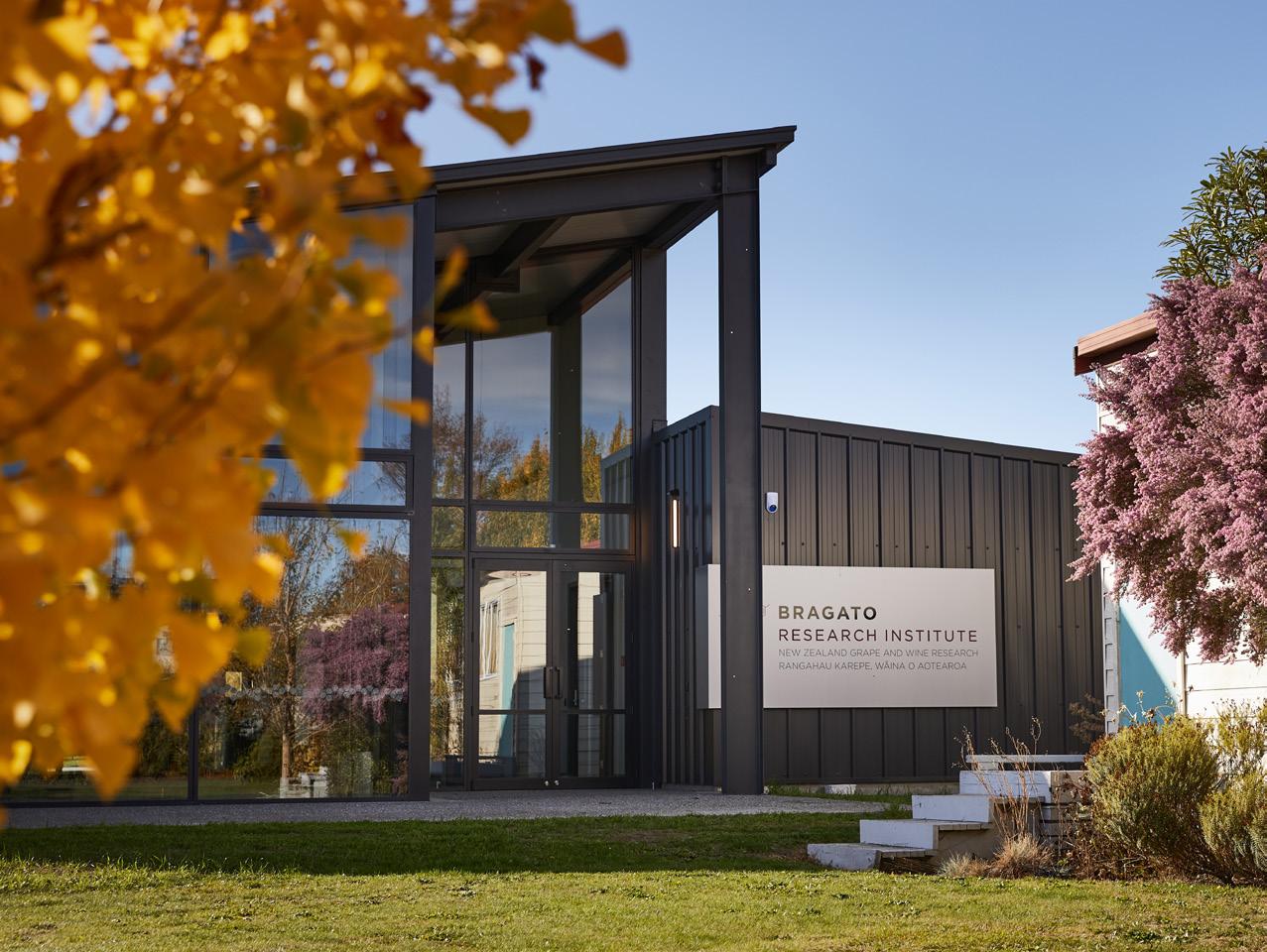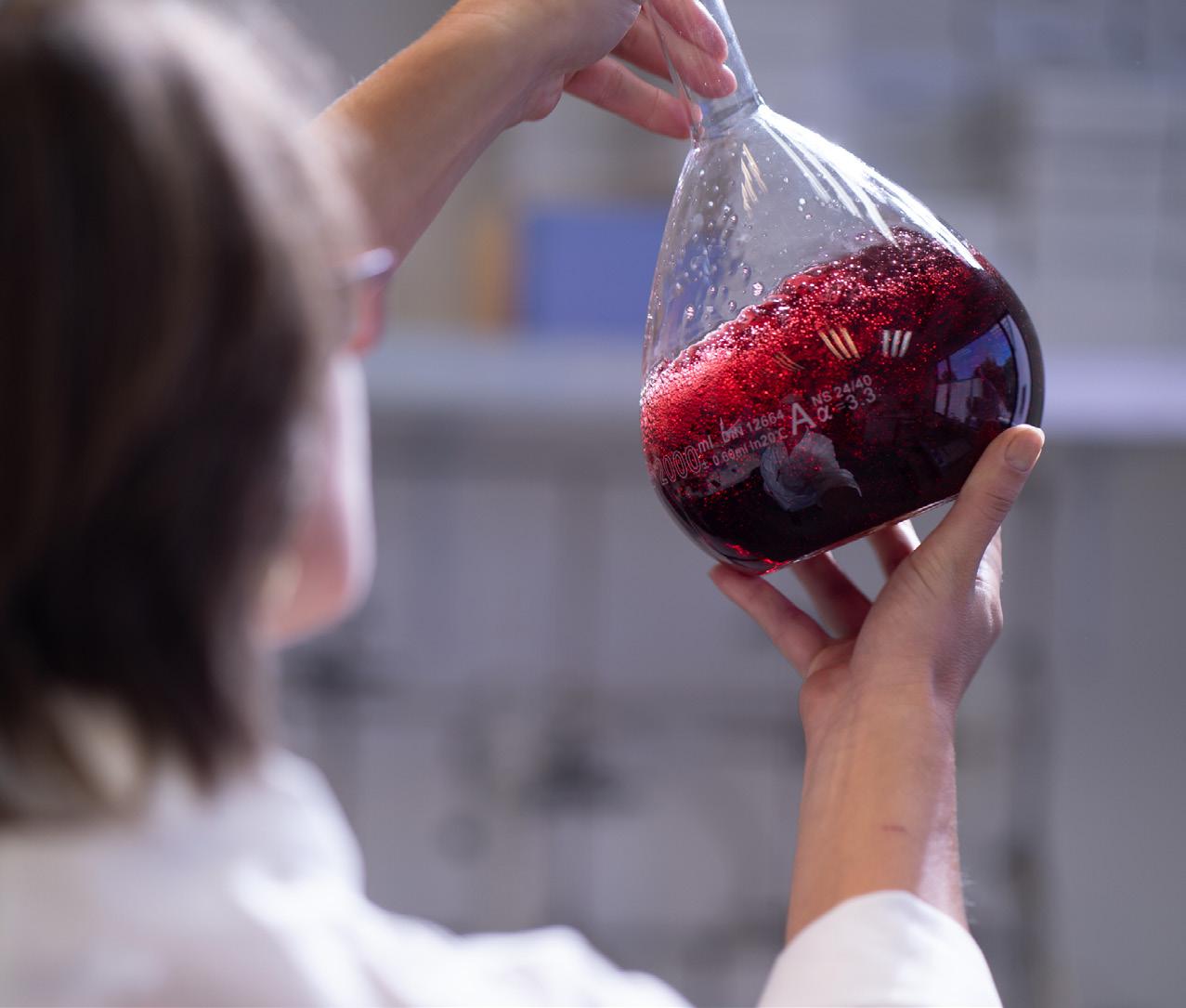
6 minute read
Research
Bragato Research Institute drives world-leading innovation for the wine industry - from stretchy science through to the practical application of science across vineyards, wineries and supply chain.
Industry impact and key outcomes
Advertisement
Bragato Research Institute (BRI), the research arm of NZW, manages all NZW levy-funded research, as well as undertaking research with additional partners. With levy funds increasingly focused on applied research into immediate needs and issues, BRI is building in-house capability—people, skills and facilities—to manage a portfolio of work to address longer term challenges and opportunities. To collaborate in executing this research, BRI has signed agreements with major partners, such as Plant & Food Research - Rangahau Ahumāra Kai, to ensure additional benefits to the industry, avoid duplication of efforts, and to strengthen relationships with longstanding research partners of NZW.
In 2020 BRI commissioned New Zealand Institute of Economic Research (NZIER) to estimate the impact of research and development (R&D) in the wine sector, and the impact of BRI activities on the Marlborough region, the national winegrowing industry and the wider economy. The reports' authors use three industry-funded projects - mechanical shaking, timing of pruning, and trunk disease - to examine the contribution of research to annual economic growth of the wine industry. Using that information as well as past studies, they concluded that research has led to annual economic growth of the wine industry between 20% and 25%, with a boost to the national economy driven by higher productivity. Additionally, NZIER found that wine R&D leads to:
•an increase in exports by $41 million
•an increase in the size of the national economy by $64.5 million
QUALITY AND PRODUCTIVITY
SUSTAINABILITY CLIMATE CHANGE DIVERSIFICATION
OPENING OF BRAGATO RESEARCH INSTITUTE RESEARCH WINERY
PEST, DISEASES AND BIOSECURITY VITICULTURE EXTENSION
6 KEY RESEARCH PRIORITIES
•a boost in household consumption by $37.2 million
•and 258 new jobs for the economy.
This financial year (2019-2020) was BRI’s second full year in operation, and NZIER found it “has created a unique business model adding value to the Marlborough and national economies.” Additionally, NZIER estimates that BRI has added: • an $8 million increase in the size of the national economy, with 30 new jobs for New Zealand, including,
•a $2.2 million increase in the size of
Marlborough’s economy.
The report concluded, “The industry must expect to continue with its R&D in order to maintain its prior gains and make new ones.” Click here for a two-page summary and full copy of the report.
Inaugural harvest for research winery
The research winery opened in February on the Marlborough Research Centre campus, adjacent to NMIT and key research partners, such as Plant & Food Research - Rangahau Ahumāra Kai. From here, we have partnered with industry and other research organisations to set the national research agenda, trial worldfirst technologies, conduct commercial trials, and connect educators and students to science and industry. With the first juice arriving in March, just before the uncertainty of lockdown and COVID-19 restrictions, BRI was not deemed an essential service. This meant current field trials couldn’t be harvested and processed, losing this vintage’s data. However, the research winery was permitted to operate as staff worked and lived in the same bubble. Led by Dr Tanya Rutan, Research Winery Manager, all commercial trials were successfully completed this inaugural year. u
Connecting education to wine research
The past year has seen several initiatives to ensure BRI’s collaboration with educators to both guide students to the wine industry and encourage diversity in science. From student experience in the research winery to BRI staff as guest lecturers, formal agreements were also signed to illustrate BRI’s commitment to Vision Mātauranga. Vision Mātauranga is the Government’s science policy framework to unlock the science and innovation potential of Māori knowledge, resources and people for the benefit of all New Zealanders. Funded by the Ministry of Business, Innovation and Employment, BRI is committed to the vision and embedding it into our research, purpose and practices.
In 2020, a memorandum of understanding (MOU) was signed with Pūhoro STEM Academy for the 2020-2021 academic year to provide a scholarship and internship. This opportunity is for a Māori student studying a tertiary qualification in a science-related field with relevance to the wine industry.
A separate MOU was signed between BRI, Eastern Institute of Technology in Hawkes Bay, Otago Polytechnic, Nelson Marlborough Institute of Technology and Marlborough Research Centre to collaborate on research and student learning. The first initiatives from these collaborations will launch in the 2020-2021 financial year.

THE INDUSTRY’S 3 MAJOR LEVY-FUNDED PROGRAMMES:
Vineyard Ecosystems Programme: Pest and Disease, Sustainability
Objective: To research and understand how management choices affect New Zealand vineyards, to increase sustainable winegrowing in the future. The programme started in 2015 and runs to December 2021.
Total Funding: $7m comprising $3.5m each from New Zealand Winegrower's levies and Ministry of Business, Innovation and Employment Partnership Fund.
Research: The Vineyard Ecosystems Programme examines how vineyard management activities can enhance biodiversity and improve grapevine performance. Work now focuses on the complex statistical modelling and analysis needed to verify trends and indicate cause and effect. While these efforts continue through to the end of the programme in 2021, applied research areas are now being summarised for industry uptake, including reduced herbicide applications for weed management, providing alternative habitats for mealybug control, and pruning wound protection against grapevine trunk disease. Lighter Wines Programme: Diversification, New Wine Styles
Objective: Position New Zealand as the world leader for high-quality, naturally grown lower-alcohol wines. The programme started in 2014 and runs to December 2020.
Total Funding: $16.97m comprising $8.84m from industry levies and participating companies, and $8.13m from Ministry for Primary Industries’ Primary Growth Partnership (PGP).
Research: Health and wellness consumer trends are not only in clear alignment with the NZ Lighter Wines Programme but look set to continue far beyond its conclusion at the end of 2020. The lower-alcohol wines developed via the NZW/PGP research partnership represent a new product category, one that can already be celebrated for market leadership and critical acclaim.
Participating companies now offer 45 products in the no, low, and loweralcohol niche. Export sales increased by 57% in the year to May 2020, reaching $8.8 million, while annual domestic sales held their own at $31.4 million.
As a result of the R&D investment, NZ Lighter Wines deliver premium, full-flavoured wines that frequently win awards in open-class wine competitions. In the past 12 months, there have been 50 new export trade listings, primarily in Australia, Canada and the United Kingdom. Internationally, New Zealand is now considered the world leader in this rapidly developing wine category.
Pinot Noir Programme: Quality and Productivity, Diversification
Objective: Growing returns through tools enabling high-quality Pinot Noir production at higher yields. The programme began in 2017 and runs to September 2022.
Total Funding: $10.3m comprising $1m from industry levies and $9.3m from MBIE’s Endeavour Fund.
Research: The programme is nearing the end of its third year. Good progress has been made in the research fields of sensory perception, chemistry, and viticultural and winemaking techniques, which have allowed researchers to begin formulating hypotheses around the definitions and measurements of quality for New Zealand Pinot Noir. The past year saw the expansion of the programme with the addition of two projects to examine the effect of macromolecules (polysaccharides) and their content in wine, as well as further understanding of green/herbaceous sensorial perception and implications for product acceptance.

BRAGATO RESEARCH INSTITUTE

BRAGATO RESEARCH INSTITUTE
To find out more about the
2020/2021 Bragato Research
Institute Research Projects visit bri.co.nz/current-research. In addition to research reports, two dozen articles were written for NZ Winegrower Magazine over the course of the year with progress or final results on levy-funded research. Ranging from Pinot Noir profiling to trunk disease, the breadth of the articles illustrate the breadth of our research programme. These articles can all be found at bri.co.nz/news





